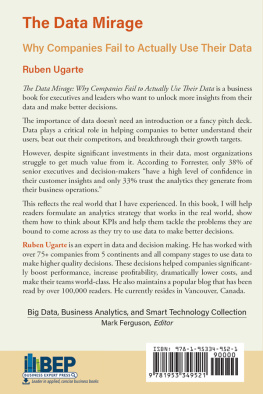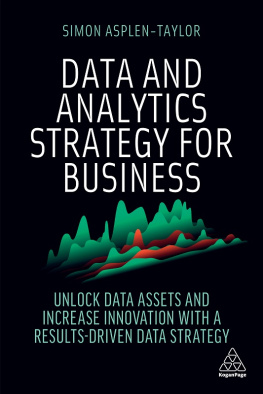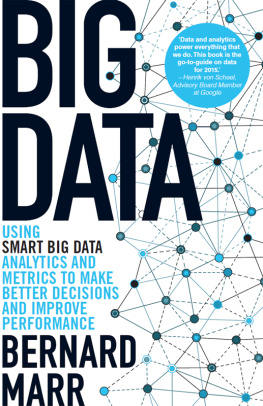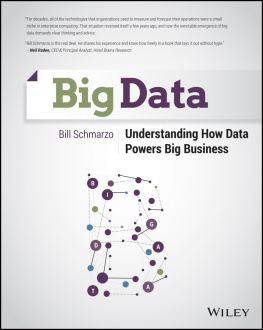Table of Contents
Guide

The Data Mirage
The Data Mirage
Why Companies Fail to Actually Use Their Data
Ruben Ugarte

The Data Mirage: Why Companies Fail to Actually Use Their Data
Copyright Business Expert Press, LLC, 2021.
Cover design by Alison Davis
Interior design by Exeter Premedia Services Private Ltd., Chennai, India
All rights reserved. No part of this publication may be reproduced, stored in a retrieval system, or transmitted in any form or by any meanselectronic, mechanical, photocopy, recording, or any other except for brief quotations, not to exceed 400 words, without the prior permission of the publisher.
First published in 2021 by
Business Expert Press, LLC
222 East 46th Street, New York, NY 10017
www.businessexpertpress.com
ISBN-13: 978-1-95334-952-1 (paperback)
ISBN-13: 978-1-95334-953-8 (e-book)
Business Expert Press Big Data, Business Analytics, and Smart Technology Collection
Collection ISSN: 2333-6749 (print)
Collection ISSN: 2333-6757 (electronic)
First edition: 2021
10 9 8 7 6 5 4 3 2 1
To my parents, who have supported most of my crazy
ideas including running my own business and being
an entrepreneur. Thank you and I love you.
Description
The Data Mirage: Why Companies Fail to Actually Use heir Data is a business book for executives and leaders who want to unlock more insights from their data and make better decisions.
The importance of data doesnt need an introduction or a fancy pitch deck. Data plays a critical role in helping companies to better understand their users, beat out their competitors, and breakthrough their growth targets.
However, despite significant investments in their data, most organizations struggle to get much value from it. According to Forrester, only 38% of senior executives and decision-makers have a high level of confidence in their customer insights and only 33% trust the analytics they generate from their business operations.
This reflects the real world that I have experienced. In this book, I will help readers formulate an analytics strategy that works in the real world, show them how to think about KPIs and help them tackle the problems they are bound to come across as they try to use data to make better decisions.
Keywords
analytics; marketing strategy; growth hacking; data; KPI; dashboards; data science; SaaS; e-commerce; mobile games; marketing attribution
Contents
The idea to write this book was in the back of my mind for four years. I kept seeing companies face the same challenges over and over again. These companies werent able to find much information online or in books. Most of the content was focused on technical topics like choosing tools or how to design visually appealing reports.
The human element of data was surprisingly missing. After all, all this data that companies are drowning in is to be used by people. So why wasnt there more on how people use data or the challenges they face? My goal in this book is to help answer these questions.
You might assume that as a Data Strategist, I think data is the answer to every question. It might surprise you to know that I think companies are relying too much on data. I understand the power of it but I also respect its limitations. My work with clients has to be rooted in reality and not in a hypothetical world.
One of the first questions that I share with clients is what game are they playing? I want them to understand that there are different ways of approaching data and no single approach is the best. Every company has a unique makeup of skills and preferences (what we might call culture) and data needs to be fit into this mold.
The most well-known data game is played by companies like Facebook and Google. They collect vast amounts of data which they then use to build better products. Better in this case means higher engagement from their users (you and me). Their approach to data is sophisticated, complex, and effective.
This is one game you could play. For these companies, data is their product and they monetize it through advertising. Everything else they do is meant to support this. Facebook has a social networking tool, Whatsapp, Instagram, and Messenger, which could be seen as products but they are all just ways in which Facebook collects data.
Google is the same. They offer free products like Gmail, Google Maps, Android, and Google Home. However, these products are just a way for them to collect data. If you dont believe me, lets look at recent quarterly of Googles revenue in 2019.
Unless youre building a similar business to Google and Facebook, this game might not be a good fit. This means that you dont need to make data the most important thing in your company. You dont need to be data-driven and have data guide your every decision. Instead, you could explore other games.
I believe most companies will benefit from a data-supported culture. This means that data plays an important role in helping you make better decisions but theres also room for opinions and gut feelings. If you dont have the data on a certain question, you can still make a decision. You arent paralyzed by the lack of evidence.
This last point is important because I have seen companies delay decisions until all the data is in. I understand prudence but there are also limitations to this approach. Instead, companies should focus on building a data strategy that helps them achieve their goals while balancing the reality of internal capabilities.
In this book, I will take you through the entire lifecycle of a data strategy. Well define the ideal future, get people onboard, choose the right technology, implement it, provide training, and mine the data for insights. Ill show you best practices along the way that I have learned from working with over 75+ companies across multiple industries and 5 continents. The principles are quite similar regardless of what your company offers.
Finally, I will help you increase the confidence in your data and the decisions that youre making. At the end of the day, Im here (and clients hire me) to help them grow their businesses.
Lets start our journey.
Ruben Ugarte,
Vancouver, Canada
June 2020
Writing this book has been an exciting journey that couldnt have happened without many peoples support. I want to thank my parents and sister for their continued encouragement to be a better person.
I also want to thank Alan Weiss and Noah Fleming, who helped shaped many of the ideas that made it into this book. I also want to thank the clients, colleagues, and partners who have been part of my practice over the last 5 years.
I also want to thank Scott, Charlene, and the rest of the BEP team for making the production of this book extremely easy. A special thanks to Exeter team for working with me through multiple iterations and fixes.
Finally, I want to thank Brian Yan Muk, Troy Liew, Tim Parkin, John Chan, and many other friends who provided feedback on the book cover, ideas, and overall structure. Apologies if I missed anyone and thank you for your support!
The only way to make sense out of change is to plunge into it, move with it, and join the dance.
Alan Wilson Watts
There were dashboards everywhere, monitoring activity across the network and showing the latest news from CNN, MSNBC, and Fox News. If anything unusual happened, you would instantly see it on one of the monitors. The company could then respond right away and prevent any serious consequences.









